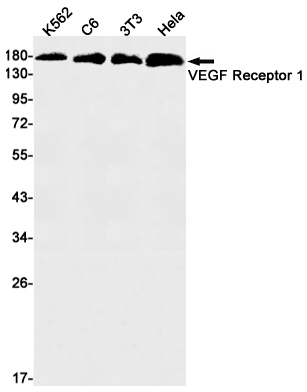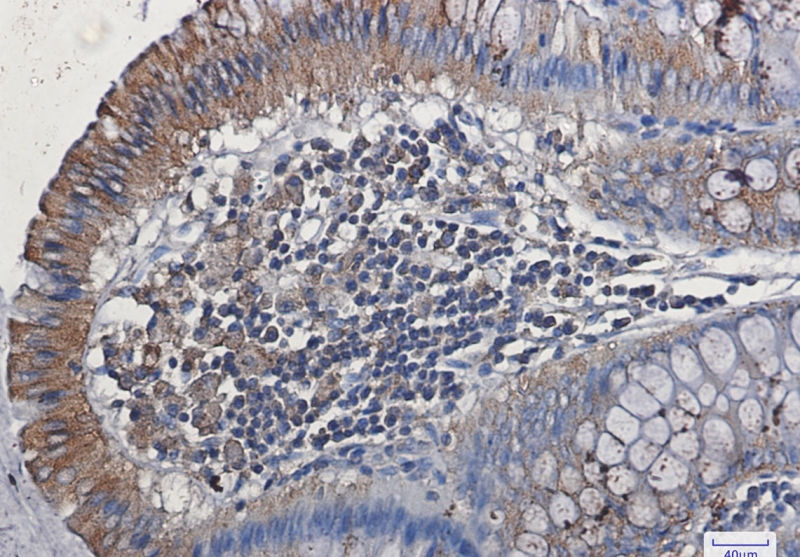

| WB | 1/500-1/1000 | Human,Mouse,Rat |
| IF | 1/20 | Human,Mouse,Rat |
| IHC | 1/50-1/100 | Human,Mouse,Rat |
| ICC | 技术咨询 | Human,Mouse,Rat |
| FCM | 咨询技术 | Human,Mouse,Rat |
| Elisa | 咨询技术 | Human,Mouse,Rat |
| Aliases | VEGFR-1; VEGF Receptor 1; FLT-1; FLT; FRT; VEGFR1; Fms-like tyrosine kinase 1; Tyrosine-protein kinase FRT |
| Entrez GeneID | 2321 |
| WB Predicted band size | Calculated MW: 151 kDa; Observed MW: 180 kDa |
| Host/Isotype | Rabbit IgG |
| Antibody Type | Primary antibody |
| Storage | Store at 4°C short term. Aliquot and store at -20°C long term. Avoid freeze/thaw cycles. |
| Species Reactivity | Human,Mouse,Rat |
| Immunogen | A synthetic peptide of human VEGF Receptor 1 |
| Formulation | Purified antibody in TBS with 0.05% sodium azide,0.05%BSA and 50% glycerol. |
+ +
以下是3篇关于VEGF Receptor 1(VEGFR1/Flt-1)抗体的代表性文献,涵盖机制研究及治疗应用:
---
1. **"Blocking neuropilin-1 function has an additive effect with anti-VEGF to inhibit tumor growth"**
*作者:Pan Q等*
**摘要**:该研究开发了一种靶向VEGFR1的单克隆抗体,发现其可通过阻断VEGF与VEGFR1的结合抑制肿瘤血管生成,并与抗VEGF药物联用增强抗肿瘤效果。
2. **"Anti-Flt1 peptide, a vascular endothelial growth factor receptor 1 antagonist, prevents ovarian cancer growth in mice"**
*作者:Huang J等*
**摘要**:通过小鼠模型证明,靶向VEGFR1的抗体片段(抗Flt1肽)能有效抑制卵巢癌血管形成及肿瘤生长,提示VEGFR1阻断在癌症治疗中的潜力。
3. **"VEGFR1-specific antagonism inhibits angiogenesis and tumor progression in vivo"**
*作者:Lüttun A等*
**摘要**:利用基因工程抗体选择性抑制VEGFR1信号通路,发现其可减少病理血管新生并延缓多种实体瘤进展,揭示了VEGFR1在促血管生成中的独立作用。
---
如需具体文章链接或更早期经典文献(如涉及抗体结构解析的研究),可进一步补充关键词或研究背景。
Vascular endothelial growth factor receptor 1 (VEGFR1), also known as Flt-1 (Fms-like tyrosine kinase 1), is a tyrosine kinase receptor primarily binding VEGF-A, VEGF-B, and placental growth factor (PlGF). It plays a dual role in regulating angiogenesis and lymphangiogenesis, acting either as a decoy receptor to modulate VEGF availability or initiating downstream signaling pathways like MAPK and PI3K-Akt upon ligand activation. Unlike VEGFR2. its signaling activity is weaker, but it is critical in pathological conditions such as tumor progression, inflammation, and vascular permeability.
VEGFR1-targeting antibodies are designed to block ligand-receptor interactions or inhibit receptor activation, thereby suppressing pro-angiogenic and pro-inflammatory pathways. These antibodies, often monoclonal (e.g., clones like 6S-676 or MF1), typically target extracellular domains such as immunoglobulin-like domains 2 or 3. In research, they serve as tools to study VEGFR1's biological functions, including its role in macrophage migration, endothelial cell survival, and tumor metastasis. Therapeutically, anti-VEGFR1 agents are explored in oncology to impede tumor angiogenesis and in ocular diseases like age-related macular degeneration to reduce abnormal vessel growth. Some candidates have entered clinical trials, highlighting their potential in diseases driven by aberrant VEGF/PlGF signaling. Challenges include optimizing specificity to avoid off-target effects on VEGFR2 and understanding context-dependent receptor roles across different tissues.
×